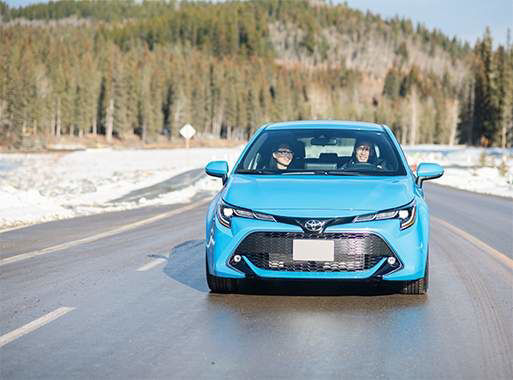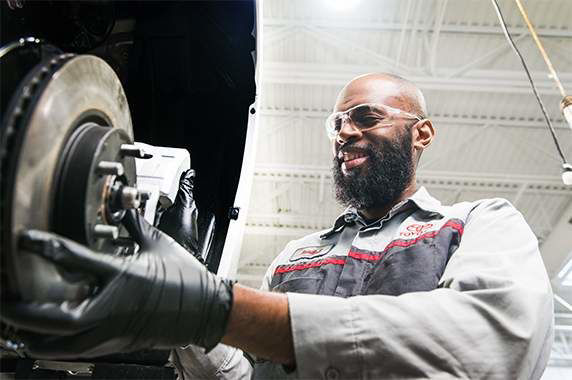Select a province & language
Entrance to this website assumes you have read and agree to these Legal Terms and Conditions and the Privacy Policy.
Entrance to this website assumes you have read and agree to these Legal Terms and Conditions and the Privacy Policy.
Here in Canada, winter driving can be an adventure. You can drive through snowdrifts, ice, and sleet - all in one commute. With all those slippery surfaces to deal with, it’s important to keep your brakes working properly. There are lots of things that make winter extremely tough on your brakes. Here are just a few.
While driving, snow and water can get into your brake pads and rotors. If the temperature dips below zero at night, that water can freeze inside your brakes, causing them to make grinding and squealing noises the next morning. As your brakes heat up while you drive, that ice usually melts away, resolving the issue. But that freezing melting freezing melting makes for a lot of wear and tear on your brakes.

Road salt is used to melt ice on the roads, so your tires can touch the road for better traction. Yay salt! But, salt is also a terror on metal and rubber parts. It speeds up vehicle rusting, especially the exposed undercarriage and area around the tires, including your brakes and brake drums. Boo salt! One good way to minimize salt damage is to get a car wash that has under spray. Doing that every couple of weeks will lengthen the life of your brakes and pretty much every other part of your vehicle. Plus you’ll get to rediscover what your car actually looks like under all that wintery salt.

After a few winters, some rust buildup on your brake rotors is inevitable. That rust can be the cause behind the oh-so-familiar squealing or squeaking noise. If your vehicle sits outside overnight, the moisture from yesterday tends to collect on the surface of the brake rotors. So the next morning, you’ll feel a roughness on your brakes. That’s just the surface rust getting scrubbed off. But you can see how a few hundred days of that can do some damage on your brakes.
Every once in a while, make sure to turn off your 90s Jock Jams playlist and just listen to your car as you drive. If you can, crack your window to hear the sounds even better. Hopefully you don’t hear anything off. But if you do, here’s a guide to what those sounds might mean for your brakes.
A squealing or squeaking is usually the first warning signal that your brake pads are starting to wear. Lots of people don’t heed this first warning. But getting your Toyota in early can be the difference between just replacing the brake pads, and making bigger, more expensive repairs.
If you hear a grinding or growling sound, that’s more serious. It usually means the brake pads are completely worn and are now are grinding into the rotor. That’s not only harmful to your vehicle, it’s also dangerous, since your brake pads have no braking material left. At this point, your vehicle is literally screaming at you to be taken in to a qualified Toyota tech.
One thing to note however: on those (hopefully rare) occasions where you need to slam on your brakes, your anti-lock brake system (ABS) will make a grinding or buzzing noise as it kicks in. That’s totally normal. But if your brakes are squeaking or grinding when you’re just driving or lightly using the brakes, that’s probably the sound of brake trouble.
There are so many incredible things to see and do during winter here in Canada. But it’s important to make sure we’re safe while we get there. So please listen to your brakes when they talk to you. Bring your Toyota home to our trained technicians.